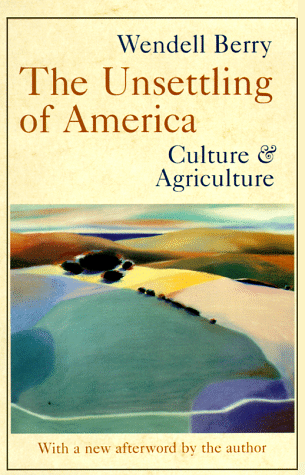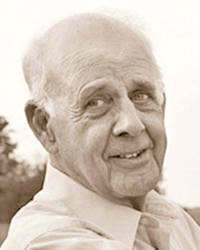 |
Home |
Catalogs |
Contact Us |

Books on:
Animal RightsBlack History
Clean Energy
Democracy
Eco Design
Eco History
Food and Nutrition
Genetic Engineering
Green Cities
Green Politics
Local Economics
Natural Building
Peace and Nonviolence
Simple Living
Trees and Forests
 |
The Unsettling of America
Culture and Agriculture
by Wendell Berry
University of California Press, 1996
Purchase
on Amazon.com
The essays in The Unsettling of America argue that today's agribusiness takes farming out of its cultural context, and is destructive to the lives of farmers and to our culture as a whole.
Praise for The Unsettling of America
"This book is about culture in the deep, ripe sense: a nurturing habitat. With unwavering focus, Wendell Berry shows what we lost of our real human American potential when we lost our commitment to living well, in place, on the land." --Gary Snyder
The Unsettling of America . . . is one of the most cogent books of the decade, and, in its claims for a healthy man- earth relationship, one of our most revolutionary." --Wallace Stegner
"Berry is a prophet of our healing." -- The New York Times Book Review
Quotes from The Unsettling of America
"In The Unsettling of America I argue that industrial agriculture and the assumptions on which it rests are wrong, root and branch; I argue that this kind of agriculture grows out of the worst of human history and the worst of human nature. . . . Every good and perfect gift comes from politicians, scientists, researchers, governments, and corporations. Evils, however, are inevitable; there is just no use in trying to choose against them. Thus all industrial comforts and labor- saving devices are the result only of human ingenuity and determination (not to mention the charity and altruism that have so conspicuously distinguished the industrial subspecies for the past two centuries), but the consequent pollution, land destruction, and social upheaval have been 'inevitable.' . . . That is to say that what happened happened because it had to happen. Thus the apologist for the ruin of agricultural lands, economies, and communities have shown always that they did nothing to stop it because there was nothing they could have done to stop it. . . . If an utterly brainless and destructive agricultural economy has been inevitable for half a century, why should it now suddenly cease to be inevitable? . . . But if the publication of The Unsettling of America and subsequent events have shown me that throwing a rock into a frozen river does not make a ripple, they have also shown that beneath the ice the waters are strongly flowing and stirred up and full of nutrients. Beneath the cliches of official science and policy, our national conversation about agriculture is more vigorous and exciting now than it has been since the 1930s." [from the Afterword]
. . .
"In the decades since World War II the farms of Henry County [Kentucky] have become increasingly mechanized. Though they are still comparatively diversified, they are less diversified than they used to be. The holdings are larger, the owners are fewer. The land is falling more and more into the hands of speculators and professional people from the cities, who--in spite of all the scientific agricultural miracles--still have much more money than farmers. Because of big technology and big economics, there is more abandoned land in the county than ever before. Many of the better farms are visibly deteriorating, for want of manpower and time and money to maintain them properly. . . Among the people as a whole, the focus of interest has largely shifted from the household to the automobile; the ideals of workmanship and thrift have been replaced by the goals of leisure, comfort, and entertainment. For Henry County plays its full part in what Maurice Telleen calls 'the world's first broad- based hedonism.' The young people expect to leave as soon as they finish high school, and so they are without permanent interest; they are generally not interested in anything that cannot be reached by automobile on a good road. Few of the farmers' children will be able to afford to stay on the farm-- perhaps even fewer will wish to do so, for it will cost too much, require too much work and worry, and it is hardly a fashionable ambition.
"And nowhere now is there a market for minor produce: a bucket of cream, a hen, a few dozen eggs. One cannot sell milk from a few cows anymore; the law-required equipment is too expensive. Those markets were done away with in the name of sanitation--but, of course, to the enrichment of the large producers. We have always had to have 'a good reason' for doing away with small operators, and in modern times the good reason has often been sanitation, for which there is apparently no small or cheap technology. Future historians will no doubt remark upon the inevitable association, with us, between sanitation and filthy lucre. And it is one of the miracles of science and hygiene that the germs that used to be in our food have been replaced by poisons."
. . .
"But in order to complete an understanding of the modern disconnection between work and value, it is necessary to see how certain 'aristocratic' ideas of status and leisure have been institutionalized in this system of education. This is one of the liabilities of the social and political origins not only of our own nation, but of most of the 'advanced' nations of the world. Democracy has involved more than the enfranchisement of the lower classes; it has meant also the popularization of the more superficial upper-class values: leisure, etiquette (as opposed to good manners), fashion, everyday dressing up and a kind of dietary persnicketiness. We have given a highly inflated value to 'days off' and to the wearing of a necktie; we pay an exorbitant price for the looks of our automobiles; we pay dearly, in both money and health, for our predilection for white bread. We attach much the same values to kinds of profession and levels of income that were once attached to hereditary classes.
"It is extremely difficult to exalt the usefulness of any productive discipline as such in a society that is at once highly stratified and highly mobile. Both the stratification and the mobility are based upon notions of prestige, which are in turn based upon these reliquary social fashions."
Table of Contents of The Unsettling of America
- The Unsettling of America
- The Ecological Crisis as a Crisis of Character
- The Ecological Crisis as a Crisis of Agriculture
- The Agricultural Crisis as a Crisis of Culture
- Living in the Future: The "Modern" Agricultural Ideal
- The Use of Energy
- The Body and the Earth
- Jefferson, Morrill, and the Upper Crust
- Margins
Reader Comments |
